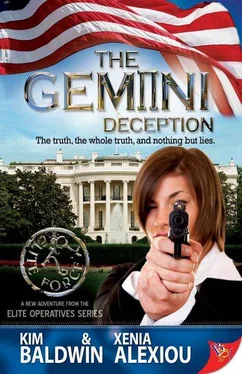Maybe this woman—who wasn’t exclusively in the same line of work—had the upper hand in some other business. But how many women headed multiple, dubious enterprises? Monty tapped his fingers again on the armrest, a nervous habit. He could only come up with two names: one had been imprisoned last year on racketeering charges, and the other…
He stopped tapping. “I’m going to mention a name.” Monty wanted more than anything, more than any other time in his life, to be wrong.
Dratshev nodded once.
“Is the woman Jack is working for called TQ…the Broker?”
Dratshev stared at him intently, the prominent vein in his forehead throbbing to the beat of his heart. Suddenly, without a word, he got up and left the room.
Monty’s hand went numb. He sat back and stared at Dratshev’s empty chair for a long time. “I told you she’d come after you, Jaclyn.” He rubbed his face. With unsteady hands, he grabbed Dratshev’s expensive notepad and pen off the coffee table and wrote: Your cat is safe. Come home. 19 8 1 4 5. He folded the paper, wrote For Jack on it, and left it on Dratshev’s desk, hoping the mob boss would pass it on if possible. “Please, be alive. I’ll find you, if it’s the last thing I do.”
Chapter Twenty-six
The White House
Next day, March 6
Shield entered the White House Press Room and surveyed the throng of reporters assembled for the impromptu press conference. Many were speculating on the reason for the gathering, and she herself was curious about what event might have transpired to prompt this last-minute addition to Thomas’s schedule. Something was brewing—the president had taken breakfast in her bedroom that morning and seemed even more preoccupied than usual during their silent journey from the residential quarters to the main floor.
They hadn’t talked at all since yesterday, when Thomas had told her to leave, and Shield honestly didn’t know what to make of her plea. Was she being asked to leave because Thomas was angry with her and didn’t want her prying in White House business? Or was it a warning? She had a feeling it was the latter.
But if the president was trying to warn her off, then why was Thomas so adamant about keeping dangerous secrets? And why was she so upset with Shield wanting to protect her?
Under other circumstances, when confronted with an attitude or lack of cooperation from some overinflated diva, Shield would have asked for a replacement. She had done it once before. But she couldn’t let go of Thomas. Something about this enigmatic president made Shield want to protect her out of personal concern, not duty. If only Thomas would let her.
White House aides admitted a few stragglers into the room and then closed the doors, indicating the press conference was about to begin.
Ryden’s nerves escalated as she stood outside the Press Room and heard the clamor from reporters inside. She was already on edge because this was to be her first full press conference. She’d managed to avoid having to answer questions during her only other appearance in this room—when she’d delivered the brief “I’m all right” statement scripted by Kenneth Moore after the assassination attempt. This time, she would have to face questions from the global press. Ratman had prepared her the best he could, with answers to every anticipated query, but unforeseen questions always popped up during these rare opportunities with the president that could catch even the real chief executive off guard.
Her makeup artist gave her a final once-over, then stepped back and nodded.
“Are you ready, Madam President?” the White House press secretary asked. He was a distinguished former journalist known for his coverage of conflicts in the Middle East.
Ryden nodded. “Go ahead, George.”
He went into the room ahead of her and told the assembled press to take their seats. Once the din had quieted, he announced, “Ladies and gentlemen, the president of the United States will be reading from a prepared statement and will then take your questions.”
Her cue. Ryden took a deep breath and straightened her posture as an aide opened the door for her. Flashes from cameras went off as she stepped to the podium. Surveying the room in a quick glance, she saw countless video cameras set up in the back of the crowded room, televising the event live around the world.
She deliberately avoided looking at Kennedy, who stood off to one side, her back against the wall.
“Good morning, everyone,” she began. The statement was typed out for her on the podium, but she had it memorized. “I’m here today with an announcement regarding one of the major cornerstones of my political agenda—my plan to curtail and eventually eliminate the illegal-arms trade in the United States. It had been my hope that a concerted approach involving funding, legislation, manpower, and cabinet-level oversight would reduce this insidious threat within our borders and impact the black-market selling of guns abroad as well.”
As Ratman had instructed, she maintained a serious and resigned expression as she continued. “One of the plan’s key backers until now—Senate Majority Leader Andrew Schuster—recently met with me to discuss his concerns about the plan as drafted and to announce that he was withdrawing his support. Without his leadership on this issue, it stands no chance of gaining the required congressional votes for approval.”
Shocked murmurs circulated through the crowed, and more flashes went off.
“Therefore, I am here today to announce that I am abandoning the plan as drafted. While it remains a goal of my administration to reduce the illegal-arms trade—which deals in billions of dollars in black-market weapons annually and is responsible for the deaths of thousands of innocent people—I must be content to participate in the efforts spearheaded by global organizations on this issue, such as the United Nations.” She paused for a few seconds. “I’m ready to take your questions.”
Nearly every reporter in the room raised their hand. Ryden had the protocol of who to favor first well memorized. Wire services came first, then the broadcast networks, national newspapers, newsmagazines, video, and, lastly, regional newspapers. How many actually were called upon was entirely up to her. She pointed to the reporter for UPI—United Press International. “Yes, Alex?”
“What were Senator Schuster’s reasons for the abrupt about-face in his position?”
Ratman had guessed that would be among the first questions.
“I’ll leave that to the senator to explain. As many of you know, he’s holding his own press conference on the Hill in an hour,” she replied. “I will tell you that our exchange was cordial, that I respect his position although I don’t agree with it, and that this in no way will affect our future working relationship on other issues of national importance. Senator Schuster has been, and will continue to be, a respected leading voice in the Democratic Party.”
She then pointed to the Associated Press reporter. “Next. Barry?”
The rest of the questions were all ones that had been anticipated, so she was able to deliver quick, eloquent responses without ever appearing flustered. No reporter delved into unrelated matters, because the content of her announcement had been so unexpected and of such great importance. After ten minutes, in keeping with Ratman’s instructions, she begged off further inquiries with a polite, “I’m sorry, ladies and gentlemen, but that’s all I have time for today,” and hastily made her exit.
Shield stayed on the president’s heels when she abruptly departed the briefing room, as surprised and mystified by the announcement as the media seemed to be. Thomas had been adamant and passionate about her feelings on the illegal-weapons issue and guns in general, a view that Shield shared and respected.
Читать дальше












